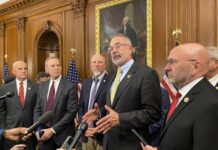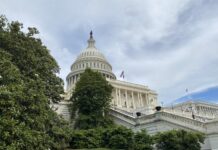
(GA Recorder) — A decision on whether a federal judge was right to rule Georgia’s anti-abortion law unconstitutional may not come until after the U.S. Supreme Court rules on Mississippi’s own restrictive measure.
The state’s appeal of the federal judge’s ruling went before a three-judge panel in the U.S. Court of Appeals for the 11th Circuit. The presiding judge, Chief Judge William Pryor, suggested multiple times during the hearing he was inclined to let the nation’s highest court settle the dispute over Mississippi’s law, which bans abortion after 15 weeks.
“The question presented, as I understand it, in (the Mississippi case), no matter which way the Supreme Court answers it – affirmatively or negatively – it seems to me that it’s going to bear directly on the correct outcome of this controversy,” Pryor said during Friday’s hearing.
“It’s not every day that … we can allow the Supreme Court to do some work for us,” he also said. “It’s nice when it happens. Isn’t this one of those situations?”
Attorneys representing both sides of the lawsuit said they did not object to waiting, although the attorney representing opponents of Georgia’s law noted the impact of a Supreme Court decision in the Mississippi case remains to be seen.
“I simply point out that the court may do the work for you or it may address a 15-week ban that prohibits substantially less abortions than the case does here. Again, we have 87% of abortions being banned under this law,” said Elizabeth Watson with the American Civil Liberties Union, who presented SisterSong Women of Color Reproductive Justice Collective and others challenging the Georgia law.
The Supreme Court has agreed to hear oral arguments in the Mississippi case on Dec. 1, with a decision expected next year.
The Mississippi case, Dobbs v. Jackson Women’s Health Organization, threatens to overturn the landmark 1973 Roe v. Wade decision, which made abortion access a constitutional right until a fetus reaches viability. The justices also recently voted in a 5-4 decision to allow a more strict Texas law to take effect for now.
Georgia’s 2019 law would ban most abortions after fetal cardiac activity can be detected, which is usually after about six weeks and before many women know they are pregnant. But a federal judge’s ruling last year blocked it from taking effect in Georgia, where women can still access abortion services until 20 weeks into a pregnancy.
But supporters of Georgia’s law are arguing the rest of the measure – such as a tax break available to expecting parents – should be allowed to take effect. The attorney representing the state, Jeffrey Harris, called these changes “common sense fetal well-being provisions” and argued they benefit women.
At least two of the judges Friday – Pryor and Barbara Lagoa, a Trump appointee; both reportedly made the former president’s shortlist for a Supreme Court pick – seemed receptive to that argument Friday.
“How is it unconstitutional to make a father pay for the cost of a pregnancy that they were partially responsible for?” Lagoa said, referring to another provision in Georgia’s law.
Could parts of the law survive if the abortion restriction fails?
Opponents of the Georgia law are pushing for the entire measure to be thrown out, including the so-called “personhood” language.
“If a law bans abortion, it is unconstitutional – period – regardless of the root or the words it uses to get there,” said Sean Young, legal director for the ACLU of Georgia.
But anti-abortion advocates said they were left hopeful Friday that the rest of Georgia’s law might be allowed to go into effect.
“We’re talking about a human life,” said Cole Muzio, president of the Frontline Policy Council, formerly known as the Family Policy Alliance. “And when we talk about providing a tax exemption, we’re treating this child with the personhood that it deserves and recognizing the reality of what that means for the mother who is experiencing expenses, experiencing the reality of carrying a human child.”
Joshua Edmonds, executive director with the Georgia Life Alliance, defended the law “as just another component of an overarching effort to build a culture that respects and protects all life in Georgia.” He said the judges Friday appeared to understand that.
“What was surprising was to see how deferential the court seems to be to the Dobbs ruling from the Supreme Court in June,” Edmonds said.
Staci Fox, though, called the tax exemption and other elements of the law a “smoke screen” for what is essentially on a ban on abortion lawmakers passed in 2019 in hopes of overturning Roe v. Wade.
Fox said Friday she expects the judges to hold off on a decision on Georgia’s law until the Supreme Court rules on the Mississippi case next year. Fox is the president and CEO of Planned Parenthood Southeast, which is one of the plaintiffs.
“I think we’re all concerned because of the politicization of the court and we would be irresponsible if we weren’t preparing for the possibility of some sort of impact, whether it be in Texas or anywhere else in the country,” Fox said, referring to the Supreme Court.
“Our job is to keep our doors open, keep providing abortion care, and keep reminding people that abortion is safe and legal and available in the state of Georgia as these things unfold,” she added.







